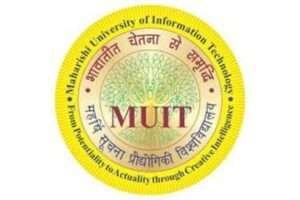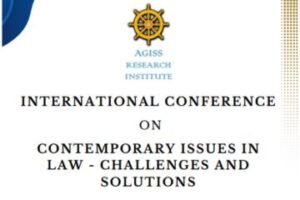CfP: XII National Online Conference on “Emerging Trends In Rule Of Law, Democratic Norms And Constitutional Values” by School of Law, CHRIST (Deemed to be University), Banglore [27th-28th January 2021] Submit by Dec 20
About School Of Law, Christ (Deemed to be University)
School of Law, is a part of CHRIST (Deemed to be University), Bangalore.
The parent University, a premier educational institution, is an academic fraternity dedicated to the motto of ‘Excellence and Service’ and has an already proven history of success in the field of education. CHRIST, formerly Christ College has the rare distinction of being the first institution in Karnataka to be accredited by the National Assessment and Accreditation Council (NAAC), UGC, and currently has an A grade as accredited in 2016 for quality education. Located in a beautiful expansive campus of CHRIST, Bangalore, School of Law is an institute imparting world-class legal education not only to students from various parts of the country but also from the Middle East and Mauritius. The courses are approved by the Bar Council of India.
About National Conference Committee
The National Conference Committee is a faculty-guided, student-run committee that is entering its 12th glorious year and has been the host for 11 successful national conferences. The committee organizes various workshops and seminars every year. This year to add to its glory the committee members propose to host webinars, online workshops, virtual research assistance programs, and the flagship icon event, National Conference. For this academic year, the committee shall work with various sub-teams (i.e., research team, tech team, creative crew, public relations) the members of which shall be specialized in the same. The National Conference Committee strives to publish an e-book after the event. The research articles submitted and presented of good equality will be chosen in E-book after thorough scrutiny for publication. . The virtual platform has provided an opportunity to the committee to broaden its reach and deliver an experience that has never been witnessed before.
Concept Note
Democracy in India has been through a dynamic process of evolution since independence in 1947. A vibrant thriving democracy, as in our country, one ought to marvel at the efficient yet complex functioning of the institutions and administration of its powers. The events of the past year and the enactment of several legislations have posed different challenging questions with respect to rule of law, democratic norms, and constitutional law as followed in India. A democratic society’s cornerstone is the rule of law. The judiciary is responsible for upholding the rule of law, democratic norms, and constitutional values. If the judiciary is to efficiently carry out its responsibilities and powers while remaining faithful to the spirit in which they are entrusted, the dignity and authority of the courts, which have been entrusted, must be preserved and protected at all costs. The principles of Separation of Powers and the Rule of Law have to be interpreted in line with the conscience of the constitution. The Tribunal Reforms Act, 2021 proposing changes in the process of constituting tribunals has become a subject of controversy. Tribunals in India have been weakened by the enormous number of vacancies for Members and Chairpersons, as well as the excessive delay in replacing them. The Act proposes to abolish several appellate bodies and reassign their powers to the overburdened high courts or commercial civil courts which lack specialization and are detrimental to the decision-making process. There are deliberations underway among the legal fraternity that the enactment of the legislation was ultra vires the government’s constitutional prerogatives and also the Act abrogates the principle of judicial independence in a deliberate attempt to override the previous judgments of the top court.
The reality is unfortunate as the trial process in India takes years with several pending cases in the courts in India. There is a need for urgent reforms in this regard. Emphasis needs to be given to rule of law especially with respect to issues of state surveillance and the Right to Privacy. The alleged use of state surveillance brings the question of serious threats associated with freedom and dignity. The enactment of Information Technology (Intermediary Guidelines and Digital Media Ethics Code) Rules, 2021 similarly has been marred by controversy regarding the alleged violation of Freedom of Speech and Right to Privacy. This has been seen by many as arbitrarily used to target individuals, crush dissent, and is against the Right to Privacy of citizens.
Understanding how to effectively safeguard fundamental rights, democratic norms, and standards, as well as how to apply them equitably remains a difficulty, especially in a diverse country such as India. Reservations in India have always been a volatile topic. With demands of the caste-based census for the purpose of identifying citizens based on caste communities, the argument posed can be seen under the garb of delivering schemes and welfare to lower caste communities but on the contrary, may also be utilized to enhance caste-based vote bank politics for political agenda. The enactment of Population Control Bills has been a matter of grave concern throughout the country as it brings upon several legal challenges such as female foeticide and has implications on personal autonomy and also religious beliefs in a secular nation. Judiciary is not always seen as an institution whose decision is always correct but seen as an institution rendered by individuals known for their wisdom, integrity, character, and impartiality. The judiciary intervenes in order to safeguard constitutional values and goals, and fundamental rights. It’s unclear if technology will be used to help create a more equal judicial system, but it’s clear that it will require a comprehensive national reform approach that includes the implementation of ICT. The National Litigation Policy, formulated by the Ministry of Law and Justice of the Government of India, was the most recent move made in this regard. As a member of the International Community, India has an obligation not only to maintain the justice delivery mechanism within the country and upkeep constitutional values but also maintain it at a global level. Most nations have created a comprehensive extradition framework to achieve this aim, however, there is a need for drawing a parity between different nations to ensure a much more efficient network system that is rooted in the aspect of mutual understanding in order to combat such injustices faced at the hands of fugitives.
There is a wide array of contemporary issues that plague the nation and demand attention. The upkeep of constitutional values is imperative when it is about the rights of common citizens and the obligations of the public servant and the elected representatives. The request of the Government of Kerala to dismiss criminal proceedings against its MLAs who were involved in a violent ruckus in the legislative assembly and destruction of public property in the assembly was denied by the Supreme Court. To contemplate whether such privileges granted to the members of legislative assemblies are misused invariably raises legal issues regarding its limits. Following the nations’ failed attempts to apply existing laws to cyberspace, the need for a new and radical regulatory framework for controlling internet pornography has emerged. Unfortunately, the progress made in this regard by the Indian law and enforcement machinery is not evident when we draw a parallel with other countries. Hence, it is a dire need that we analyze the challenges that pop up whilst attempting to regulate cyber pornography amidst the Indian backdrop, as well as simultaneously come up with effective solutions which can be successfully implemented.
Who is it for
The National Conference by School of Law, CHRIST (Deemed to be University) cordially invites research papers from law students, legal academicians, and legal practitioners.
Theme and sub-theme
EMERGING TRENDS IN RULE OF LAW, DEMOCRATIC NORMS, AND CONSTITUTIONAL VALUES
SUB THEME 1: RULE OF LAW
1. Tribunal Reforms and Judicial Independence
2. Access to Justice and its Transformation in India
3. Expediting the Trial Process in India
4. State Surveillance and Right to Privacy
SUB THEME 2: DEMOCRATIC NORMS
1. Regulation of OTT Platform: Censoring Issues and limitations
2. Anti-Conversion Laws: Is It a Threat to Secularism and Fundamental Rights?
3. Trends in Reservation Policy in India: An Evaluation
4. Population Control Bills and its Constitutional Ramifications
SUB THEME 3: TRENDS IN JUDICIAL PROCESS IN INDIA
1. The Digitisation of Indian Judicial process: Challenges and the Way Forward
2. Implementation of AI and Digitisation of Judicial system
3. National Litigation Policy and Its implementation
SUB THEME 4: MISCELLANEOUS
1. Fugitive Justice and Reciprocity Between States
2. The Legality of Withdrawal of Prosecution
3. Cyber Pornography: Regulatory Challenges
Submission Guidelines
The abstract should not exceed 300 words and must be accompanied with a
cover page stating:
Sub-theme
Title of the Paper
Name of the Author(s)
Name of the Institution
E-mail Address
Postal Address
Contact number
A cover letter mentioning the Name of the Author(s), Course, Year of Study
(if applicable), Name of the College/University (if applicable), Professional
Position (if applicable), Title and Theme of the Paper, with Postal Address,
Email Address and Contact Number.
Registration form & Payment – The details of the same shall be intimated to
the participants whose abstracts get selected.
The abstract should not exceed 300 words and must be accompanied with a
cover page stating:
The abstract file shall be named as:
<Theme number>_<full name of the author(s)>.
For eg: i) Single Authorship: Theme1_RajeevShankar
ii) Co-Authorship: Theme1_RajeevShankar&RahulMohan
All submissions of the abstracts for the E-Conference must be electronically submitted. Click here to submit your abstract. The word limit of the full paper shall be 3000 – 4000 words (excluding footnotes/annexure/reports etc.) and must be accompanied with the
following details:
-A cover letter mentioning the Name of the Author(s), Course, Year of Study
(if applicable), Name of the College/University (if applicable), Professional
Position (if applicable), Title and Theme of the Paper, with Postal Address,
Email Address and Contact Number.
-Registration form & Payment – The details of the same shall be intimated to
the participants whose abstracts get selected.
Formatting Requirements
-The main text of the full paper and the abstract should be in Times New
-Roman with font size 12 and line spacing of 1.5.
-The footnotes should be in Times New Roman, font size 10 with a spacing of
-1.0 (Endnotes are not permitted)
-One-inch margins should be maintained on all four sides of the pages.
-Citation Style: Bluebook, 20th edition.
-The abstract and full paper have to mandatorily be submitted in .pdf format only.
Note
Co-authorship is permitted to a maximum of two authors and at least one author must attend the E Conference to present the paper. No Proxy presentations are allowed. The School of Law, CHRIST in keeping with its mandate of publishing original works only, adopts a stringent anti-plagiarism policy. Any paper containing any unattributed work is thus liable to be rejected.
Important Dates
Abstract Submission- December 20, 2021 till 11:59 P.M
Communication of Acceptance of Abstract- December 20, 2021
Last date for Registration and Payment- January 10, 2022
Submission of Full Papers- January 15, 2022
Platform
CISCO WebEx shall be used for paper presentation and conduct of National
Online Conference. Further, details on the usage and registration to the
platform will be shared to the participants at a later stage.
Registration fee
1. For Students: Rs.800/-for single authorship and Rs.1200/- for co-
authorship
2. For Research Scholars, Academicians and Professionals: Rs.1000/- for
Single authorship and Rs.1400/- for co-authorship.
Rewards
1. E-Certificate to every participant who duly submits and presents the paper.
2. Publication of the best articles under each sub-theme in the proposed E-
book carrying ISBN number.
For any further details contact
Email ID – slcuconference@law.christuniversity.in
Website- https://slcuconference.wordpress.com/
Instagram- slcu_national.conference.comm
or contact Student Convenors:
Anusha Ann Paul (anusha.paul@law.christuniversity.in) (+91-9538640385)
Sahil Ujawane (sahil.ujawane@law.christuniversity.in) (+91-8983021279)
.Original link to the Conference https://slcuconference.wordpress.com/themes-sub-themes/
Click here for the brochure
Previous Posts
National Virtual Moot Court Competition, 2021
2nd International Seminar on Human Rights & International Law
1st Constitution Day National Literary Fest, 2021




